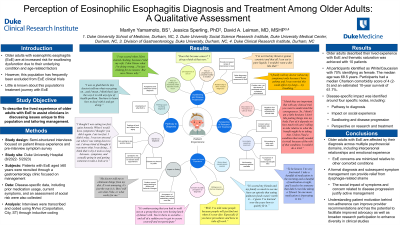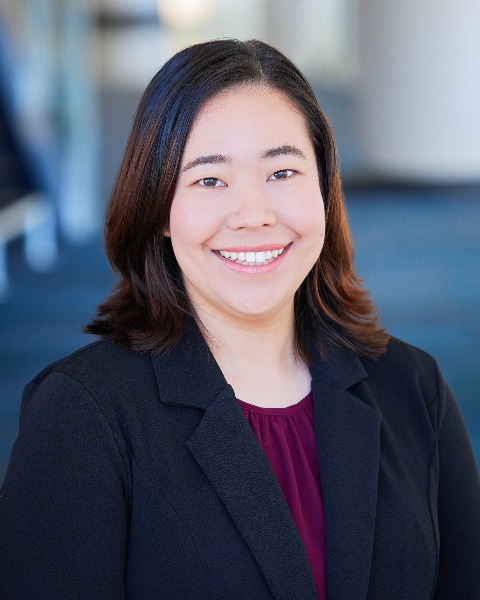Monday Poster Session
Category: Esophagus
P1834 - Perception of EoE Diagnosis and Treatment Considerations Among Older Adults: A Qualitative Assessment
Monday, October 23, 2023
10:30 AM - 4:15 PM PT
Location: Exhibit Hall

Has Audio

Marilyn Yamamoto, BS
Duke University School of Medicine
Durham, NC
Presenting Author(s)
Marilyn Yamamoto, BS1, Jessica Sperling, PhD2, David Leiman, MD, MSHP3
1Duke University School of Medicine, Durham, NC; 2Duke University Social Science Research Institute, Durham, NC; 3Duke University Medical Center, Durham, NC
Introduction: Older adults with eosinophilic esophagitis (EoE) are at increased risk for swallowing dysfunction due to their underlying condition and age-related factors. However, this population has frequently been excluded from EoE clinical trials and little is known about their treatment journey with EoE. We aimed to describe the lived experience of older adults with EoE to assist clinicians in discussing issues unique to this population and tailoring management.
Methods: Patients with EoE aged ≥60 years were recruited through a gastroenterology clinic focused on EoE management to participate in semi-structured interviews focused on their illness experience. Disease specific data, including prior medication usage, current symptoms, and an assessment of social risk were also collected. The interview tool was developed iteratively through pre-testing and recruitment was completed after achieving thematic saturation. Interviews were transcribed and coded using NVivo (Corportation, City, ST) through inductive coding.
Results: Ten participants (70% female) with a median age of 68.5 were interviewed (Table 1). Nine themes emerged (Figure 1), with feelings of fault regarding symptoms prominently reported. Symptoms were often initially attributed to consequences of aging but after receiving an EoE diagnosis there was a consistently reported sense of relief. An acknowledgment that symptoms could be managed with therapy was moderated by regret related to disease impacts on social participation. However, stated competing priorities from other medical conditions result in hesitancy to medically treat their symptoms or engage in EoE clinical trials.
Discussion: Older adults with EoE are affected by their diagnosis across multiple psychosocial domains, including interpersonal relationships and emotional experience. A formal diagnosis and subsequent symptom management can provide relief from dysphagia-related shame. Specific EoE concerns are minimized relative to other co-morbid conditions, though the social impact of symptoms and concern related to disease progression justify active management. Understanding patient motivation behind non-adherence to medical therapy can improve provider recommendations and has the potential to facilitate improved advocacy as well as broaden research participation to enhance diversity in clinical studies.

Disclosures:
Marilyn Yamamoto, BS1, Jessica Sperling, PhD2, David Leiman, MD, MSHP3. P1834 - Perception of EoE Diagnosis and Treatment Considerations Among Older Adults: A Qualitative Assessment, ACG 2023 Annual Scientific Meeting Abstracts. Vancouver, BC, Canada: American College of Gastroenterology.
1Duke University School of Medicine, Durham, NC; 2Duke University Social Science Research Institute, Durham, NC; 3Duke University Medical Center, Durham, NC
Introduction: Older adults with eosinophilic esophagitis (EoE) are at increased risk for swallowing dysfunction due to their underlying condition and age-related factors. However, this population has frequently been excluded from EoE clinical trials and little is known about their treatment journey with EoE. We aimed to describe the lived experience of older adults with EoE to assist clinicians in discussing issues unique to this population and tailoring management.
Methods: Patients with EoE aged ≥60 years were recruited through a gastroenterology clinic focused on EoE management to participate in semi-structured interviews focused on their illness experience. Disease specific data, including prior medication usage, current symptoms, and an assessment of social risk were also collected. The interview tool was developed iteratively through pre-testing and recruitment was completed after achieving thematic saturation. Interviews were transcribed and coded using NVivo (Corportation, City, ST) through inductive coding.
Results: Ten participants (70% female) with a median age of 68.5 were interviewed (Table 1). Nine themes emerged (Figure 1), with feelings of fault regarding symptoms prominently reported. Symptoms were often initially attributed to consequences of aging but after receiving an EoE diagnosis there was a consistently reported sense of relief. An acknowledgment that symptoms could be managed with therapy was moderated by regret related to disease impacts on social participation. However, stated competing priorities from other medical conditions result in hesitancy to medically treat their symptoms or engage in EoE clinical trials.
Discussion: Older adults with EoE are affected by their diagnosis across multiple psychosocial domains, including interpersonal relationships and emotional experience. A formal diagnosis and subsequent symptom management can provide relief from dysphagia-related shame. Specific EoE concerns are minimized relative to other co-morbid conditions, though the social impact of symptoms and concern related to disease progression justify active management. Understanding patient motivation behind non-adherence to medical therapy can improve provider recommendations and has the potential to facilitate improved advocacy as well as broaden research participation to enhance diversity in clinical studies.

Figure: Figure 1: Four categories impacting patient experience emerged through partially structured interviews with participants.
Disclosures:
Marilyn Yamamoto indicated no relevant financial relationships.
Jessica Sperling indicated no relevant financial relationships.
David Leiman: Astra Zeneca – Consultant. Bristol Myers Squibb – Stock-publicly held company(excluding mutual/index funds). Medtronic – Consultant. Novo Nordisk – Consultant. Sanofi – Advisor or Review Panel Member. Takeda – Grant/Research Support.
Marilyn Yamamoto, BS1, Jessica Sperling, PhD2, David Leiman, MD, MSHP3. P1834 - Perception of EoE Diagnosis and Treatment Considerations Among Older Adults: A Qualitative Assessment, ACG 2023 Annual Scientific Meeting Abstracts. Vancouver, BC, Canada: American College of Gastroenterology.
